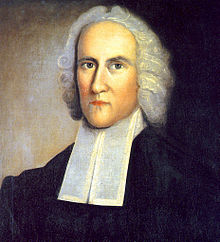For the next few Fridays I thought I'd start a series on Jonathan Edwards and Youth Ministry. So here's a taster of what is to come in the following weeks!
‘Pinpointing the genesis of youth
ministry is not as simple as one might imagine.’[1] It has been argued that it began with Jesus’
own disciples and has been a feature of church life ever since. Some argue that it began in the 1880s with
the Society of Christian Endeavour, while still others that the rise of Young
Life in the early 1940s saw the genesis of youth ministry.[2] With this in mind we turn to our question, ‘Is
it defensible to argue that Jonathan Edwards invented youth ministry?’ It has been argued that because of Jonathan
Edwards’s extensive and specific work with the youth of Northampton that he is
the forerunner, or inventor of modern day youth ministry. In order to assess this claim, we must first
get clear in our minds what we mean by ‘youth ministry’. Following this we will then examine the
context of Puritan family life prior to the ministry of Edwards in order to
determine if Jonathan Edwards did something new in his time. Secondly, continuing to look at the social
setting of Edwards’s ministry, the changing setting of Northampton in the 1730s
and 40s will be outlined, especially regarding the youth of the town. We will then examine how Edwards responded to
these changes and challenges in his ministry.
Having examined the evidence, the claim that Edwards invented youth
ministry will be assessed.
I'm looking forward to unpacking this all with you over the next few Fridays!
I'm looking forward to unpacking this all with you over the next few Fridays!
[1] Mark W. Cannister, ‘Youth Ministry’s Historical Context: The Education
and Evangelism of Young People’, in Starting Right: Thinking Theologically
about Youth Ministry (ed. Kenda Creasy Dean, Chap Clark, and Dave Rahn; Grand
Rapids, Mich: Zondervan/Youth Specialities Academic, 2001), 77.
[2] Cannister, ‘Youth Ministry’s Historical Context: The Education and
Evangelism of Young People’, 77.



Tom Bergler, the professor that visited me in Tassie, is a youth ministry historian. He just wrote a book that, in part, details the history of youth ministry on this side of the pond, tracing it back to the formation of "youth culture" - the time period when public schools began combining townships effectively creating, for the first time, large groups of young people separated by age - peer groups. The book is The Juvenilization of American Christianity. Here is an article that briefs the book: http://www.christianitytoday.com/ct/2012/june/when-are-we-going-to-grow-up.html
ReplyDeleteAnother article he wrote that may be of interest is here: http://www.youthspecialties.com/articles/enduring-myths-of-youth-ministry-lessons-we-can-learn-from-our-catholic-mai
Developed by NetEnt quantities to more than 200 and there are many of|there are numerous} of them which have been among the many most popular for online on line casino gamers since their launch. The superior graphics, sound and mathematics ship video games with a 95-98% payout, which has a helpful impact on participant lifetime worth. When it comes to enhancing participant lifetime worth and on line casino efficiency, our video games pack a severe punch! That’s as a result of|as a outcome of} we’re 파라오카지노 passionate in regards to the product we create and we delight ourselves on making the best slots within the business. The algorithm in a slot machine is a Random Number Generator . An RNG randomly shows the values of the spin on a reel.
ReplyDelete5096D6B7AE
ReplyDeleteDecorating your home with unique and personalized designs has become easier than ever, especially with the availability of innovative printing techniques. One such method is dtf transfer, which allows for high-quality, vibrant images to be transferred onto various surfaces. Whether you want to customize apparel or home decor, this technique offers versatility and durability. Many hobbyists and professionals alike are now turning to dtf transfer for their creative projects. It truly opens up a world of possibilities for custom designs.